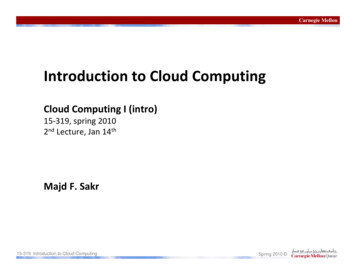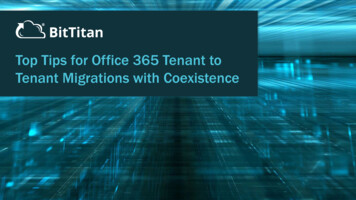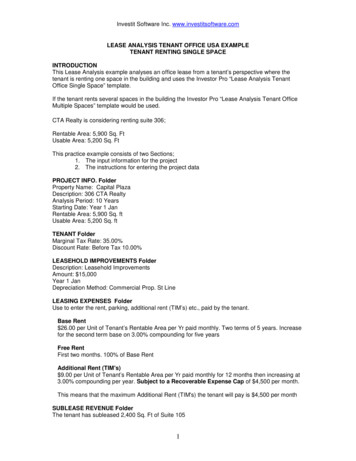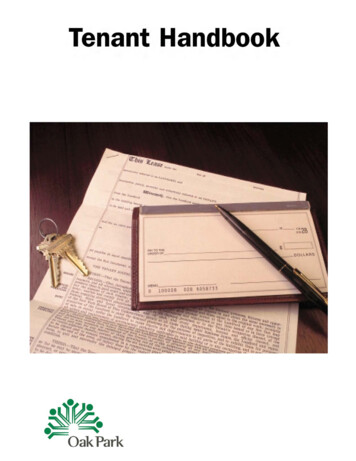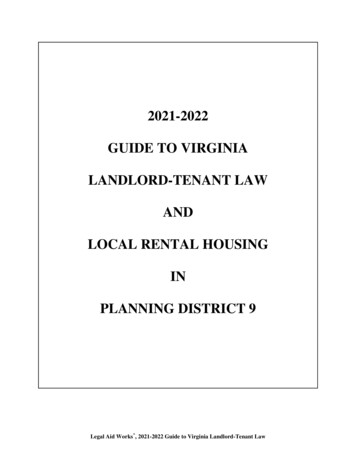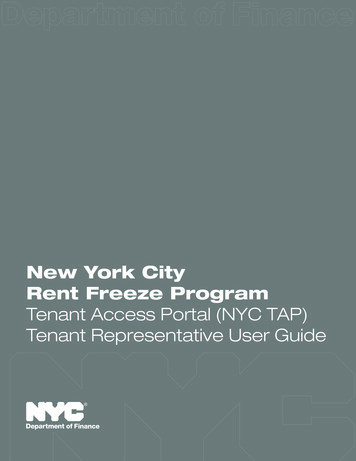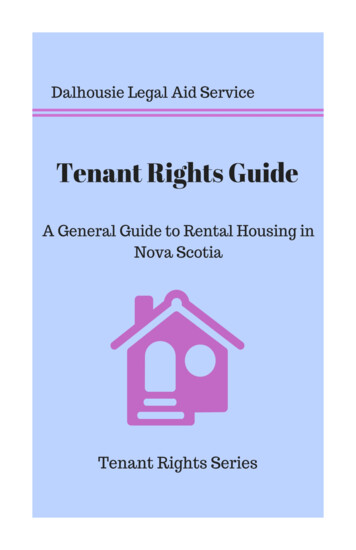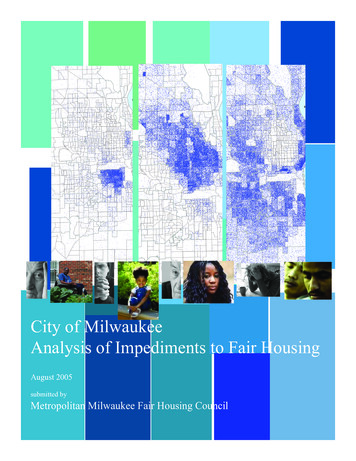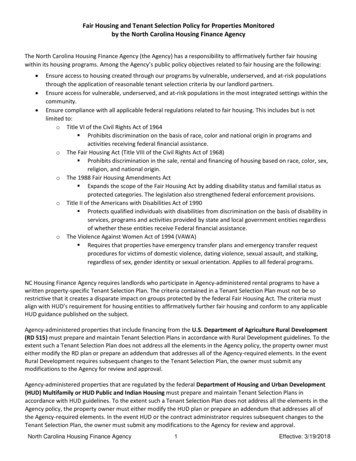
Transcription
Fair Housing and Tenant Selection Policy for Properties Monitoredby the North Carolina Housing Finance AgencyThe North Carolina Housing Finance Agency (the Agency) has a responsibility to affirmatively further fair housingwithin its housing programs. Among the Agency’s public policy objectives related to fair housing are the following: Ensure access to housing created through our programs by vulnerable, underserved, and at-risk populationsthrough the application of reasonable tenant selection criteria by our landlord partners.Ensure access for vulnerable, underserved, and at-risk populations in the most integrated settings within thecommunity.Ensure compliance with all applicable federal regulations related to fair housing. This includes but is notlimited to:o Title VI of the Civil Rights Act of 1964 Prohibits discrimination on the basis of race, color and national origin in programs andactivities receiving federal financial assistance.o The Fair Housing Act (Title VIII of the Civil Rights Act of 1968) Prohibits discrimination in the sale, rental and financing of housing based on race, color, sex,religion, and national origin.o The 1988 Fair Housing Amendments Act Expands the scope of the Fair Housing Act by adding disability status and familial status asprotected categories. The legislation also strengthened federal enforcement provisions.o Title II of the Americans with Disabilities Act of 1990 Protects qualified individuals with disabilities from discrimination on the basis of disability inservices, programs and activities provided by state and local government entities regardlessof whether these entities receive Federal financial assistance.o The Violence Against Women Act of 1994 (VAWA) Requires that properties have emergency transfer plans and emergency transfer requestprocedures for victims of domestic violence, dating violence, sexual assault, and stalking,regardless of sex, gender identity or sexual orientation. Applies to all federal programs.NC Housing Finance Agency requires landlords who participate in Agency-administered rental programs to have awritten property-specific Tenant Selection Plan. The criteria contained in a Tenant Selection Plan must not be sorestrictive that it creates a disparate impact on groups protected by the federal Fair Housing Act. The criteria mustalign with HUD’s requirement for housing entities to affirmatively further fair housing and conform to any applicableHUD guidance published on the subject.Agency-administered properties that include financing from the U.S. Department of Agriculture Rural Development(RD 515) must prepare and maintain Tenant Selection Plans in accordance with Rural Development guidelines. To theextent such a Tenant Selection Plan does not address all the elements in the Agency policy, the property owner musteither modify the RD plan or prepare an addendum that addresses all of the Agency-required elements. In the eventRural Development requires subsequent changes to the Tenant Selection Plan, the owner must submit anymodifications to the Agency for review and approval.Agency-administered properties that are regulated by the federal Department of Housing and Urban Development(HUD) Multifamily or HUD Public and Indian Housing must prepare and maintain Tenant Selection Plans inaccordance with HUD guidelines. To the extent such a Tenant Selection Plan does not address all the elements in theAgency policy, the property owner must either modify the HUD plan or prepare an addendum that addresses all ofthe Agency-required elements. In the event HUD or the contract administrator requires subsequent changes to theTenant Selection Plan, the owner must submit any modifications to the Agency for review and approval.North Carolina Housing Finance Agency1Effective: 3/19/2018
For all Agency-monitored properties, regardless of HUD or RD participation, a property’s Tenant Selection Plan must: Specify how applicants are selected for tenancy. All criteria used in the decision-making process must beincluded in the plan. The plan must have enough specificity that the applicant can read it and reasonablydetermine their likelihood of acceptance to the property.Contain screening criteria that is no more restrictive than described in section 3 below.Be clearly posted in the property rental office as well as anywhere else applications are disseminated,including websites. Copies of the Tenant Selection Plan must be available to applicants upon request.All properties subject to Agency monitoring must: Submit a Tenant Selection Plan for Agency review and approval:o New properties placing in service on or after January 1, 2019 must submit a plan that meets therequirements enumerated below.o Properties receiving funding through the Integrated Supportive Housing Program (ISHP) must submita plan that meets the requirements enumerated below as a condition of ISHP loan closing.o Existing properties which have an approved Tenant Selection Plan based on the Agency’s FairHousing and Tenant Selection policy published on July 5, 2016 are required to update the plan tocomply with the requirements enumerated below no later than January 1, 2021.Implement any Agency required lease addenda addressing fair housing (see Appendix E - Mandatory TaxCredit Lease Addendum):o New leases executed on or after January 1, 2019 must include the addenda.o Lease renewals that occur on or after January 1, 2019 must include the addenda.Failure to comply with either of these requirements, or failure to satisfactorily address concerns or deficienciesidentified by the Agency, may result in the property owner and/or agent being considered not in good standing andresult in a suspension from doing future business with the Agency until the issue is corrected.North Carolina Housing Finance Agency2Effective: 3/19/2018
Note: A sample Tenant Selection Plan accompanies this policy – see APPENDIX D – and may be adopted (withappropriate property-specific edits) in whole or in part, or used as guidance when developing a Tenant SelectionPlan.Tenant Selection Plans at a minimum must:1.Describe the population for which the housing is intended. Include all regulatory restrictions.a.Income Restrictionsi.Maximum, if applicable, stated as a number of units at % of median income. Specify how thespecific income limit is available – website address, contacting the on‐site office, or as anattachment to the written Tenant Selection Plan.ii.Minimum, if any, must not be so restrictive as to create a barrier to housing for an applicantwith a federal or state housing voucher/rent assistance. All minimum income requirementsmust take into account the rental subsidy/rental assistance. Landlords should either exempthouseholds with rental assistance from the policy itself, or base the minimum income on thetenant’s out of pocket rental payment and utility allowance. See Sample TSP (APPENDIX D)for suggested language.iii. Affirm that reliance on state and federal housing vouchers will not be grounds to deny anapplication.b.Population Type (family or elderly)i.The plan must state whether the property is intended to house families or the elderly.ii. If elderly, cite the federal definition selected and address the number of units subject to whichage restriction and describe the age restriction for the head of household and for the otherhousehold members, if any. If there are units with no age restriction, the number of such unitsmust be stated. If the property is subject to Targeting Program requirements, regardless ofthe allocation year, the age restrictions must conform to APPENDIX A – Definition of Elderlyand Ensuring Access for Applicants Referred through the Targeting Program.c.Student Statusi. Include the student rules that govern the property, if any. Either clearly define an eligiblestudent or clearly define an ineligible student. Properties with multiple funding sources mustinclude all student requirements. See APPENDIX B – Student Rules.North Carolina Housing Finance Agency3Effective: 3/19/2018
2.Describe the occupancy policy, if any.a.3.Minimum and maximum household size by number of bedrooms in the unit, if such a policy has beenestablished.Describe all screening criteria.a.Credit Reportsi.Describe with enough specificity that an applicant can reasonably self‐determine whetherthey meet the requirements of the credit criteria.ii.The Tenant Selection Plan must state that the credit screening criteria will be waived forapplicants – including additional household members, if any – participating in programs orreceiving assistance which provides the landlord with the ability to recover any economiclosses related to the tenancy (i.e. risk mitigation tools such as HUD Special Claims andTargeting Program Special Claims). (Explanation: The benefit of risk mitigation applies to thehousehold, not the applicant alone.)iii. If good standing with the local utility companies used by the unit (electric, gas, and/or water)is a requirement, this must be stated. Additionally, the screening criteria must state that thisrequirement is waived if the applicant is participating in a program that pays the utilitydeposit. Cable and internet cannot be included in the good standing requirement.b.Criminal Record Checksi.Describe with enough specificity that an applicant can reasonably self‐determine whetherthey meet the requirements of the criminal criteria. The criminal criteria must be no morerestrictive than the Model Policy on Screening Applicants with Criminal Records (APPENDIXC). (Note: In order to not comply with this requirement, an owner must show evidence thatdoing so would violate another regulatory restriction, or that the property has some otherunique and compelling circumstance agreed upon by the Agency.)ii. At a minimum, the screening criteria must not be so restrictive that the criteria creates adisparate impact on groups protected by the federal Fair Housing Act: Race Color National Origin Sex Religion Disabled Status Familial StatusThe criteria must align with HUD’s requirement for housing entities to affirmatively furtherfair housing and conform to any applicable HUD guidance published on the subject.North Carolina Housing Finance Agency4Effective: 3/19/2018
c.Landlord Referencesi.Describe with enough specificity that an applicant can reasonably self‐determine whetherthey meet the requirements of the landlord reference criteria.ii. To the extent that the landlord reference is negative due to unpaid rent or money owed, thescreening criteria must state that this will not be held against applicants – including additionalhousehold members, if any – participating in programs or receiving assistance which providesthe landlord with the ability to recover any economic losses related to the impending tenancy(i.e. risk mitigation tools such as HUD Special Claims and Targeting Program Special Claims).(Explanation: The benefit of risk mitigation applies to the household, not the applicant alone.)Should the participating tenant – eligible for the assistance with the risk mitigation tools – move out of the unit,management may rescreen remaining tenants at the time of lease renewal using the screening criteria thetenants would have otherwise been subject to at move-in. Management may opt to not renew the lease forcause if the remaining tenants no longer meet eligibility criteria without the presence of the participatingtenant.4.Describe all preferences or priorities established for the property.a.Include all local, state or federal preferences and how they impact selection from the propertywaiting list.b.Describe the documentation required to establish that an applicant is eligible to be considered underone of the preferences.c.For properties participating in the Targeting Program, the following disclosure should be used:The property participates in a state program in which X [insert the actual percentage] percentof the units in the property are set aside as they become available to house eligible applicants(and their household members) receiving a referral from the North Carolina Department ofHealth and Human Services. Until the percent of units is reached, those applicants will beoffered units ahead of anyone else on the waiting list.5.Describe the application process used at the property.a.Specify how pre‐applications (if applicable) and applications are taken. Any alternative methods foraccepting applications should be clearly stated.b.Application fees may be charged to cover the actual cost of checking a non-Targeting Programapplicant’s program eligibility criteria such as credit history, if applicable, criminal background, andlandlord references. The fee may not exceed the amount required to recover the average actual costto process an application. The fees must be disclosed in the Tenant Selection Policy. A fee cannot becharged for verification of income (a free method may be utilized).North Carolina Housing Finance Agency5Effective: 3/19/2018
6.7.8.c.Application fees may not be charged to Targeting Program applicants (or their household members),or to applicants from the Transition to Community Living Initiative (TCLI) program.d.Reservation fees, or their equivalent, are prohibited -- regardless of whether they are applied towardthe security deposit -- as an unacceptable barrier to access to affordable housing. Security deposits areallowed, and must comply with NC General Statute Chapter 42, Article 6 (Tenant Security Deposit Act).(Explanation: Reservation fees are defined as any fee imposed by the owner to encumber the unit.Payments [called “hold fees”] offered by DHHS to extend the availability of a vacancy are allowed.)Describe the waiting list used for the property.a.Specify the number of written waiting lists used to select a tenant household for the property, theirpurposes, and the priority ranking between the lists.b.Specify how applicants are selected from each waiting list – first come, first serve or othermethodology.c.Specify how preferences impact selection from the waiting list(s).d.Specify how the waiting list is updated to maintain fairness and accuracy. Disclose the circumstancesunder which an applicant is removed from the waitlist.e.Specify the methods of advertising used to announce opening and closing of the waiting list.f.Specify the policies on opening and closing the waiting list.For properties with multiple levels of income and rent targeting, address the following:a.Specify how applicants are selected for the various rent levels available at the property.b.Specify the policy for assigning lower rent levels to in place tenants versus waitlisted applicants asthey become available at the property.Describe the procedure used to notify applicants of acceptance or rejection.a.Describe the process and timeline for notifying applicants of acceptance, what the applicant needs todo and in what timeframe to encumber the unit, and the period the unit will be held before moving tothe next applicant.North Carolina Housing Finance Agency6Effective: 3/19/2018
b.Describe the process and timeline for notifying applicants of rejection, the method of notificationwhich must include a written form of notification, appeal rights and the process and requirements forfiling an appeal. The specific reasons for the rejection must be included in all communications and mustbe based solely on the written criteria specified in the Tenant Selection Plan. If based on informationreceived from a third party, contact information must be provided so the rejected applicant caninvestigate and challenge the adverse information.c.Appeal rights, process and deadlines must be clearly specified in writing. The deadline must be noless than eight business days from the date of the denial notification letter.d.The right to a Reasonable Accommodation by an applicant with a disability must be clearly stated inthe policy and in all communications with an applicant regarding rejection of the application.9.Contain a nondiscrimination statement that lists the federal, state and local protected classes.10.The intent to comply with all applicable federal regulations related to fair housing.a.For all properties this includes, but is not limited to: the Fair Housing Act, the 1988 Fair HousingAmendments Act, Title VI of the Civil Rights Act of 1964, and the Violence Against Women Act (VAWA).b.For properties receiving any federal funds:i.In addition to complying with 10(a) above, Section 504 of the Rehabilitation Act of 1973.ii. The landlord shall determine, as part of its obligations to take reasonable steps to ensuremeaningful access to the property and its programs by persons with Limited EnglishProficiency (LEP), those Oral Language Services (i.e. Interpretation) and Written LanguageServices (i.e. Translation) that may be required in connection with the implementation of thisPlan.iii. Fair Housing and accessibility logos must appear on company documents.11.Describe the process and timeline for a disabled applicant to request a reasonable accommodation and/ormodification of an apartment, policy, or process and the timeline for the management agent to respond. If areasonable accommodation request is submitted, the unit must be held until the request determination isfinalized and communicated in writing to the applicant. In the event of a denial of a request for reasonableaccommodation, the applicant must be afforded eight business days to challenge the decision before the unitcan be rented to another qualified applicant.North Carolina Housing Finance Agency7Effective: 3/19/2018
12.Include Unit Transfer Policies.a.Procedures for selecting between applicants on the waiting list and current tenants who need a unittransfer for the reasons below should be included in the plan.i.Family Sizeii.Change in Family Compositioniii. Medical Reason, inclusive of physical, behavioral, and mental healthiv. Need for Accessible Unitv.Need for reasonable accommodationvi. Households residing in an accessible unit that do not need the accessibility features1. If you have a transfer policy, describe it.2. If you have federal funding (HOME, Project Based Section 8, Rural Development), atransfer policy must be in place. Describe the policy.b.Transfer and redecorating fees are prohibited if the reason for the transfer is any of those listedabove.13.Disclose Pet Policy, if any. If the property has a pet policy, it must include exception language addressingservice and assistance animals.14.Disclose Smoking Policy, if any.15.Disclose any other mandatory policies or programs in place at the property that an applicant needs to beaware of before applying to the property (down payment assistance program, etc.).This policy is not intended as legal advice and does not provide a legal opinion as to the matters stated. Itis recommended that all property owners consult with an attorney that is well versed in fair housing lawwhen making decisions regarding tenant selection criteria.North Carolina Housing Finance Agency8Effective: 3/19/2018
APPENDIX ADefinition of Elderly and Ensuring Access for Applicants Referred through the Targeting ProgramThe federal Fair Housing Act provides three choices of elderly definition that allow a property owner toexclude children from residency within a property without being liable for discrimination on the basis offamilial status. 55 Years of Age and Older – This is housing intended and operated for households in which at leastone person in the household is 55 years of age or older, per unit, in at least 80% of the property’sunits. 62 Years of Age and Older – This is housing intended for, and occupied solely by, persons age 62 andolder. A property qualifies as 62 and Older housing if all occupants of the household in all of the unitsin the property are 62 years old or older. State and Federal Elderly Housing Program – This is housing operated under a federal or state housingprogram that the Secretary of HUD has determined is specifically designed and operated to assistelderly persons. The definition of elderly is defined in the rules of the housing program (an exampleis HUD 202).Owners of properties financed by NC Housing Finance Agency that are designated as elderly should selectthe 55 and Older definition unless there is a compelling reason to select the 62 and Older definition, such asbeing a requirement for federal assistance. In order to ensure access to targeted units by otherwise eligiblehouseholds, it is the policy of the Agency to require that properties selecting the 55 and Older definitionaccept applicants referred through the Targeting Program who are 45 years of age and older in acommensurate percentage of the units allowed to house families under the age of 55. Therefore,properties with a Targeting requirement should not specify that 100% of the units must house someoneage 55 or older. This requirement applies regardless of date of Agency funding or year of allocation of taxcredits.The following language is suggested for incorporation into the Tenant Selection Plan for a property utilizingthe 55 and Older definition: In units [at least 80%], one household member must be at least 55 years of age. In units [up to 20%, but at a minimum, the number of units required in the property’s TargetingUnit Agreement], one household member must be at least 45 years of age. All additional household members in the units addressed above must be at least years of age.Owners may set the age restriction on targeted units in properties utilizing the 55 and Older definition lowerthan 45, but not higher. In order to not comply with this requirement, an owner must show evidence thatdoing so would violate another regulatory restriction, condition of local development approval or some otherunique and compelling circumstance.This appendix is not intended as legal advice. It is recommended that an owner consult with an attorneythat is well versed in fair housing law when making decisions regarding age restrictions.North Carolina Housing Finance Agency9Effective: 3/19/2018
APPENDIX BStudent RulesSourceFederal Funding (HUD,including HOME andRD)RequirementStudents who are enrolled as either a part-time or full-time student at aninstitution of higher education for the purpose of obtaining a degree,certificate or other program leading to a recognized educational credential areNOT ELIGIBLE if the individual: is under the age of 24, or is not married, or is not a veteran of the United States Military, or does not have a dependent child, or is not a person with disabilities, as such term is defined in 3(b)(3)(e) of theUnited States Housing Act of 1937 (42 U.S.C. 1437a(b)(3)(e) and was notreceiving section 8 assistance as of November 30, 2005), or is not living with his or her parents who are receiving Section 8 assistance,and is not individually eligible to receive Section 8 assistance and has parents(the parents individually or jointly) who are not income eligible to receiveSection 8 assistance.Note: Supplemental guidance on student eligibility may be found at 24 CFR5.612.Federal Tax Creditswithin 15 years of DatePlaced In ServiceA household where all members are full-time students is ineligible for residencyunless the household falls in any one of these exceptions: All members are married and entitled to file a joint tax return. The household is comprised of a single parent(s) with minor children whereneither the parent nor at least one child is claimed as dependents onsomeone else’s tax return other than the absent parent of the children. The household receives Temporary Assistance to Needy Families (TANF). The student participates in a program receiving assistance under the JobTraining Partnership Act, Workforce Investment Act, or similar federal,state or local program. The student was previously in foster care.Federal Tax CreditsNo applicable student rules.beyond 15 years ofDate Placed In Service;NC Housing Trust Fund;other non-Federalfunding; SHDPProperties with multiple funding sources must include all student requirements. For tax credit properties,property owners may impose additional student rules.North Carolina Housing Finance Agency10Effective: 3/19/2018
APPENDIX CModel Policy on Screening Applicants with Criminal RecordsScreening ProcessIn an addendum to the application form, the management company will explain its policies and procedureson criminal records and will inform the applicant of his or her right to request a reasonable accommodation.The addendum will also inform the applicant of his or her opportunity to submit with the application evidenceof mitigating circumstances if the individualized assessment is triggered.The management company may conduct a criminal background check on each adult member of anapplicant household. An adult means a person 18 or older.If the criminal background report reveals negative information about a household member and themanagement company proposes to deny admission due to the negative information, the subject of therecord (and the applicant, if different) will be provided notice of the proposed adverse action and anopportunity to dispute the accuracy of the record. The notice will include the name, address and telephonenumber of the agency that composed the criminal record report and inform the applicant of his or her rightto dispute the accuracy of the criminal record report as well as his or her right to a free copy of the criminalrecord report.If the applicant does not contact the management company to dispute the accuracy of the criminal recordwithin eight business days, the management company will send a written notice of ineligibility to theapplicant stating the specific reason for denial and advise the applicant of their appeal rights and – if disabled– their right to request a reasonable accommodation, if applicable.Admissions Criteria(Note: The ‘exclusion’ and ‘individualized assessment’ periods specified below are from the date ofconviction, not from the date of release from incarceration.)If a member of an applicant household has been convicted of a felony offense involving the sale ormanufacture of a controlled substance, the management company: Will deny admission if the conviction occurred within 5 years of application; May deny admission if the conviction occurred more than 5 years but within 10 years of application;and Will not deny admission if the conviction occurred more than 10 years before application.If a member of an applicant household has been convicted of a violent felony offense, the managementcompany: Will deny admission if the conviction occurred within 5 years of application; and May deny admission if the conviction occurred more than 5 years before application.If a member of an applicant household has been convicted of a nonviolent felony offense, the managementcompany: May deny admission if the conviction occurred within 7 years of application; and Will not deny admission if the conviction occurred more than 7 years before application.North Carolina Housing Finance Agency11Effective: 3/19/2018
If a member of an applicant household has been convicted of a violent misdemeanor, the managementcompany: Will deny admission if the conviction occurred within 2 years of application; and May deny admission if the conviction occurred more than 2 years before application.If a member of an applicant household has been convicted of a nonviolent misdemeanor offense, themanagement company: May deny admission if the conviction occurred within 5 years of application; and Will not deny admission if the conviction occurred more than 5 years before application.A violent felony is a Class A, B, C, D, E, F or G felony or any felony requiring registration on the sex offenderregistry. A nonviolent felony is a Class H or I felony.A violent misdemeanor is a Class A1 misdemeanor or a misdemeanor requiring registration on the sexoffender registry. A nonviolent misdemeanor is a Class 1, 2 or 3 misdemeanor.The management company will not consider an arrest or charge that was resolved without conviction. Inaddition, the management company will not consider expunged or sealed convictions.Where the management company “may deny” admission to a household based on a criminal conviction, themanagement company will conduct an individualized assessment of the criminal record and its impact on thehousehold’s suitability for admission before making a determination.If a person has an arrest with pending charges, the housing provider should consider this as part of anindividualized assessment. If the housing provider is not able to determine the specifics of the pendingcharges, the housing provider may deny admission until the charges are resolved. If the housing provider canidentify the specifics of the pending charges, they should house the person if a resulting conviction wouldnot change the decision to house. Because a pending charge once adjudicated could be dismissed, reduced,or the accused found not guilty, the housing provider should either house the person or delay thedetermination until the charge is resolved if a resulting conviction of the initial charge would be grounds fordenying the application for housing. If the person has a disability and requests a reasonable accommodation,the provider should determine whether the request is appropriate while criminal charges are pending.This individualized assessment will include consideration of the following factors:(1) the seriousness of the criminal offense;(2) the relationship between the criminal offense and the safety and security of residents, staff orproperty;(3) the length of time since the offense, with particular weight being given to significant periods ofgood behavior;(4) the age of the household member at the time of the offense;(5) the number and nature of any other criminal convictions;(6) evidence of rehabilitation, such as employment, participation in a job training program,education, participation in a d
North Carolina Housing Finance Agency 3 Effective: 3/19/2018 Note: A sample Tenant Selection Plan accompanies this policy - see APPENDIX D - and may be adopted (with appropriate property-specific edits) in whole or in part, or used as guidance when developing a Tenant Selection Plan. Tenant Selection Plans at a minimum must: 1.
